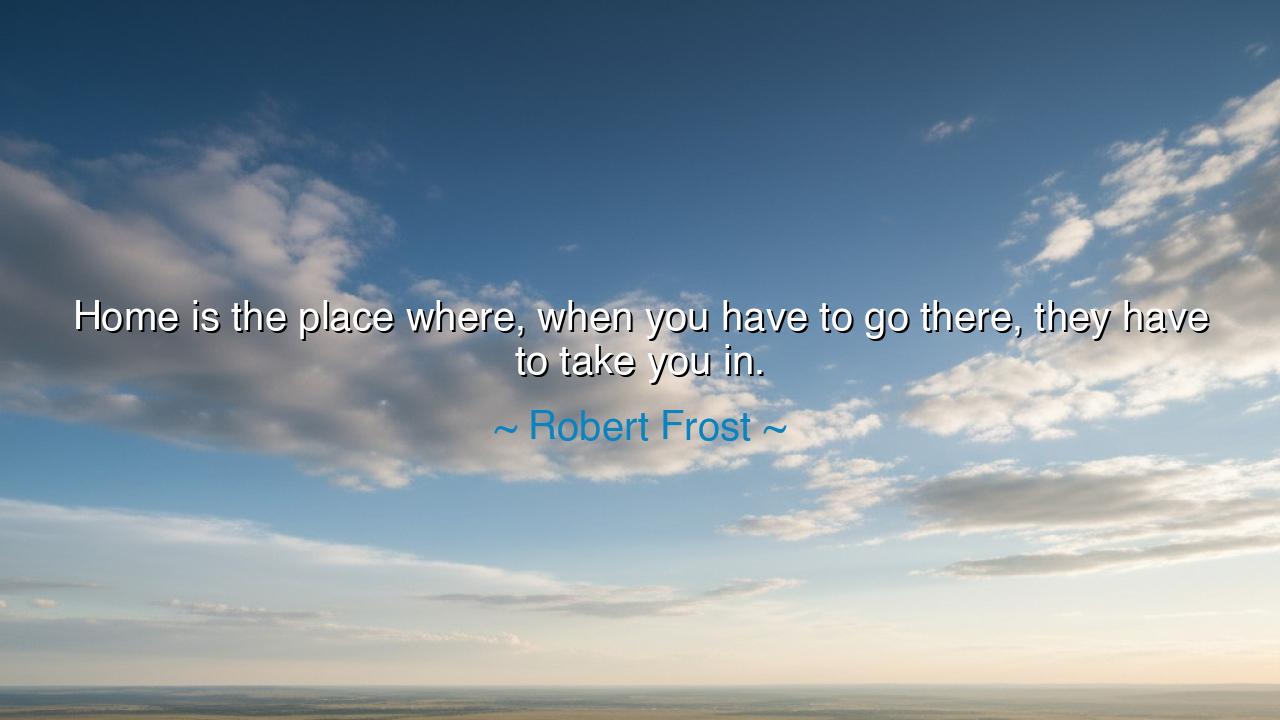
Home is the place where, when you have to go there, they have to






“Home is the place where, when you have to go there, they have to take you in.” Thus wrote Robert Frost, the poet of the New England soil, whose verses carry both the ache and the grace of belonging. In this quiet yet piercing line—from his poem The Death of the Hired Man—Frost captures the essence of what home truly is: not merely a dwelling of walls and roof, but a sacred covenant of the heart. It is the one place on earth where acceptance is not earned but given, where love is not weighed but offered, where forgiveness endures beyond pride or distance.
The origin of this quote lies in Frost’s deep understanding of human relationships, particularly the fragile balance between duty and compassion. In The Death of the Hired Man, an old laborer returns to the farm he once abandoned, broken and near death. The farmer’s wife, Mary, pleads that they take him in, saying that “home” is not where one deserves to go—it is where one must be received. In that moment, Frost reveals the eternal truth of mercy: that love is greatest not when it is deserved, but when it is given despite everything. Home, in this sense, is not geography—it is grace.
For Frost, who knew hardship and solitude all too well, these words were born not from sentimentality but from the deep wisdom of suffering. He lived through the deaths of children, the struggle of poverty, and the loneliness of a poet’s life. Yet through all this, he came to understand that the soul’s greatest hunger is not for success or comfort, but for belonging—the knowledge that somewhere, no matter what one has done, there remains a hearth still open, a face still kind. The heart longs for that one door that never closes.
History, too, speaks of this truth. When Odysseus, the weary wanderer of Homer’s Odyssey, finally returns to Ithaca after twenty years of war and exile, he finds not the palace of luxury but the place where love has waited through time’s cruelty. His wife, Penelope, has remained faithful, and his home—though overrun by suitors—still stands as the one place where he may finally rest. Like Frost’s line, the story of Odysseus teaches that home is not perfection, but permanence; it is the one bond that neither distance nor failure can fully sever.
In the modern age, when the world urges men to wander endlessly, Frost’s words strike with even greater power. Many build grand houses but no longer build homes. Many surround themselves with possessions yet feel no warmth of belonging. To return home, in Frost’s meaning, is not simply to revisit a place but to seek again the heart’s origin—to stand before those who know your flaws and still open their arms. It is an act both humbling and holy, for it reminds us that love is not conditional, but absolute.
Yet Frost’s insight carries also a quiet warning. A home that “has to take you in” is not merely a gift—it is a responsibility. To make a home is to keep alive the spirit of forgiveness and understanding, even when resentment would be easier. Every heart that opens its door becomes a guardian of mercy. As Frost’s poem suggests, it is not always easy to welcome those who have failed or left, yet it is precisely in that welcome that humanity proves its worth.
The lesson, then, is clear: build your home not merely with wood and stone, but with patience, humility, and compassion. Be the one who “takes in” rather than turns away. Let your love be the kind that endures the return of the prodigal, that forgives the wanderer, that shelters the weary. For in doing so, you not only give another soul rest—you create the one thing the world cannot corrupt: a true home.
So, O listener, remember Frost’s eternal truth: home is not the place of perfection, but the place of return. It is where love waits without condition, where hearts remember before they judge. Build such a home within your walls—and within yourself—and you will have created a refuge that neither time nor distance can destroy. For in the end, to give and to be given that welcome is the nearest thing to heaven that earth can offer.






AAdministratorAdministrator
Welcome, honored guests. Please leave a comment, we will respond soon